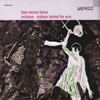Henze Aristaeus; Orpheus Behind the wire
Fine showings by Orpheus’s offspring
View record and artist detailsRecord and Artist Details
Composer or Director: Hans Werner Henze
Genre:
Opera
Label: Wergo
Magazine Review Date: 11/2006
Media Format: CD or Download
Media Runtime: 69
Mastering:
Stereo
DDD
Catalogue Number: WER6680-2

Tracks:
| Composition | Artist Credit |
|---|---|
| Orpheus behind the wire |
Hans Werner Henze, Composer
Berlin Radio Chorus Hans Werner Henze, Composer Robin Gritton, Conductor |
| Aristaeus |
Hans Werner Henze, Composer
Berlin Symphony Orchestra Hans Werner Henze, Composer Marek Janowski, Conductor Martin Wuttke, Zeidar |
Author: Guy Rickards
The Orpheus story has inspired several Henze works, most particularly the eponymous dance-drama written to a scenario by Edward Bond in 1978. Aristaeus (1997, rev 2003) is a reconsideration of that work told this time from the point of view of the lustful shepherd whose pursuit of Eurydice leads to her death. One of several partial recensions, it is the second to feature the shepherd – the finale of Henze’s Solo Violin Sonata being the first. Aristaeus is, therefore, a mix of old and new, containing evolutions from the older work alongside new material.
There is some enchanting music in its near-50-minute duration, though – as with Nørgård’s The Will-o’-the-Wisps Go to Town (A/06) – around a quarter of its length is unaccompanied narration, aside from two short passages where the speaker’s part intertwines with the orchestra. For non-German speakers this may become trying on repetition but makes the work seem fragmentary. When allowed to flow unimpeded, the music is revealed as a more integrated conception.
Since Stefan Parkman’s fine Chandos account with the Danish Radio Choir of the a cappella choral suite Orpheus Behind the Wire (12/91) – one of the earlier satellites from Orpheus – is no longer available, this newcomer has the field to itself. It is meticulously prepared and sung and though it does not equal the sheer beauty of tone that Parkman and Chandos achieved, Robin Gritton does extract even more intensity. Placing it after Aristaeus would, however, have made better musical as well as narrative sense.
There is some enchanting music in its near-50-minute duration, though – as with Nørgård’s The Will-o’-the-Wisps Go to Town (A/06) – around a quarter of its length is unaccompanied narration, aside from two short passages where the speaker’s part intertwines with the orchestra. For non-German speakers this may become trying on repetition but makes the work seem fragmentary. When allowed to flow unimpeded, the music is revealed as a more integrated conception.
Since Stefan Parkman’s fine Chandos account with the Danish Radio Choir of the a cappella choral suite Orpheus Behind the Wire (12/91) – one of the earlier satellites from Orpheus – is no longer available, this newcomer has the field to itself. It is meticulously prepared and sung and though it does not equal the sheer beauty of tone that Parkman and Chandos achieved, Robin Gritton does extract even more intensity. Placing it after Aristaeus would, however, have made better musical as well as narrative sense.
Discover the world's largest classical music catalogue with Presto Music.

Gramophone Digital Club
- Digital Edition
- Digital Archive
- Reviews Database
- Full website access
From £8.75 / month
Subscribe
Gramophone Full Club
- Print Edition
- Digital Edition
- Digital Archive
- Reviews Database
- Full website access
From £11.00 / month
Subscribe
If you are a library, university or other organisation that would be interested in an institutional subscription to Gramophone please click here for further information.




